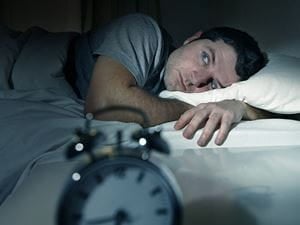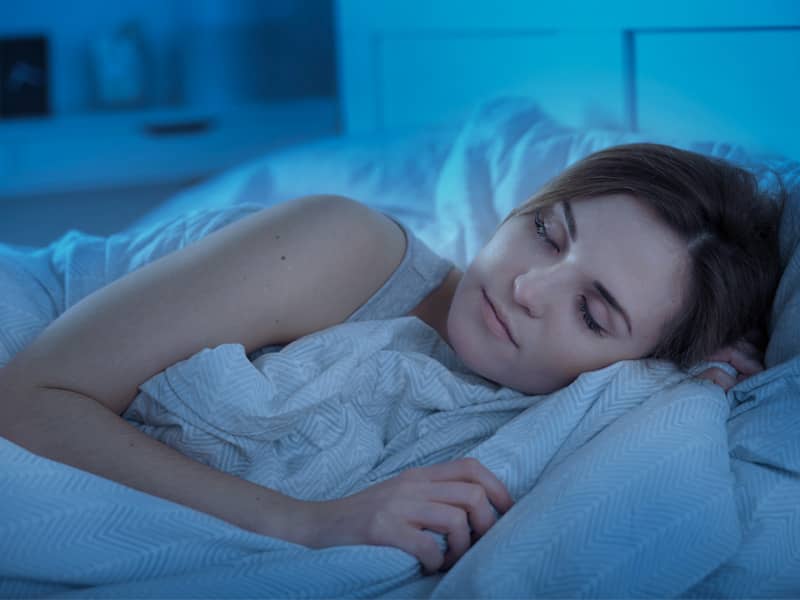
Shutterstock.com
Toxins Build Up in the Brain
Sleep is a time of bodily maintenance and the central nervous system is no exception. When a person sleeps, their body clears toxins from the brain. Many of these toxins are naturally occurring and are natural by-products of other bodily functions. When a person gets a healthy amount of sleep, these toxins are flushed away every night without issue. If a person starts skipping sleep, however, the body does not have enough time to clear away all of the toxins. Slowly, these toxins start to build up in the brain. This can cause the loss of concentration and memory known as “brain fog,” but it can also lead to more sinister and sever consequences. Toxic build up in the brain can lead to migraines and inflammation of the brain.Perhaps the most dangerous toxin that builds up during a sleep shortage is the protein beta-amyloid which has been linked to Alzheimer’s disease. To make matters worse, the more beta-amyloid that builds up, the harder it is for a person to sleep. This in turn builds up more beta-amyloid and forms a vicious and dangerous cycle.
Slower Reflexes
For today’s office worker, slower reflexes may not seem like a serious issue. Most people do not think of themselves as needing quick reflexes in their daily lives, but anyone who drives a car needs their reflexes in top shape. “Driving drowsy” has been found to be just as dangerous as driving drunk. A person who is drowsy has slower reflexes and reactions making them more likely to get in an accident. Someone who is tired will also be more easily distracted and less aware of their surroundings. This can easily lead to a disaster when the tired person is strapped to 4,000 pounds of rocket-fueled metal.Suppressed Immune System
When a person starts skipping out on sleep, their immune system pays the price. When a person is sleep deprived, the number of T-cells that fight illnesses drops. A lack of sleep also means that fevers tend to stay lower. While this sounds like a good thing, a fever is the body’s response to an illness. Germs themselves do not cause fevers. Fevers come from the body raising its internal temperature to fight off an illness. If a fever cannot get high enough, the body cannot fight off the illness, and fevers tend to rise at night. No sleep means that the body cannot make the most of its fever response, so a person is left running a lower fever for a much longer time.Many people are aware that sleep helps them fight off colds, but sleep deprivation also carries a much greater and hidden danger: a lack of sleep makes vaccines less effective. Some people get vaccinated against influenza every year, but almost everyone has been vaccinated against much more dangerous diseases. When a person does not sleep, the effectiveness of those vaccines decreases leaving a person vulnerable to catching a disease they thought they were protected against.
Heart Disease
Lack of sleep has been linked to an increased risk of heart disease. This is in part due to the fact that sleep deprivation leads to higher levels of C-Reactive Protein, also called CRP, which is a marker of the sort of inflammation that is associated with heart disease.A lack of sleep can also lead to weight gain and obesity. Part of the relationship is due to the fact that lack of sleep means lower willpower and lack of impulse control. These in turn lead a person to eat both more than necessary and higher calorie foods. Sleepiness can also lead a person to think they are hungrier than they are and therefore lead to overeating.
Sleep deprivation also causes imbalances in the hormones that are linked to weight retention. When those hormones are out of flux, a person is more likely to have a high body mass index and a greater risk for obesity, both of which are significant risk factors for heart disease.
Hallucinations
Serious sleep deprivation can lead to hallucinations. These hallucinations may be auditory, visual or tactile. These hallucinations can come as a result of acute sleep deprivation when a person suddenly goes a long time without sleeping such as a college student studying for midterm exams or an adult skipping several nights sleep to prepare for an important meeting. Sleep deprivation induced hallucinations can also be the result of chronic sleep deprivation such as that found with serious and clinical insomnia.Sleep deprivation hallucinations run the gamut from benign to terrifying. A person might hear music playing when their phone is turned off, feel like they are floating or believe that they see a horrific figure standing by their bedside. Regardless of how the hallucination manifests, it is a sign of serious sleep deprivation that may indicate a sleep disorder that requires medical intervention.
Genetic Disruption
A 2013 study found that sleep is required for normal genetic function. When a person skips out on shut-eye, their genes stop functioning correctly. Researchers found that one night of sleeping less than six hours per night, which is normal for many people, led to more than 700 genes behaving abnormally. Some of the genes that were malfunctioning were those that controlled the immune system and the body’s stress responses. Any genetic disruption, however, should be deeply concerning. Cancer, after all, is nothing more or less than a mutation caused by genetic disruption.Sleep is often overlooked and ignored in today’s society. Continuing to put sleep low on the priority list, however, can lead to serious consequences for a person’s mental and physical health. Any person who consistently gets too little sleep but cannot identify the reason behind their insomnia, should seek medical attention. They may be one of the hundreds of thousands of people who have undiagnosed sleep disorders, and sleep is too important to ignore.

